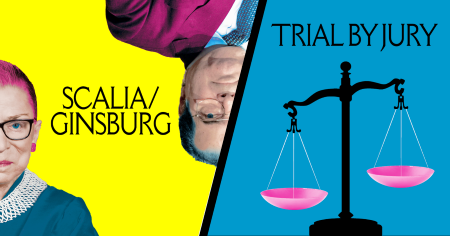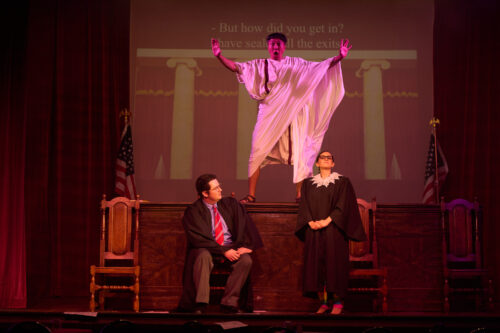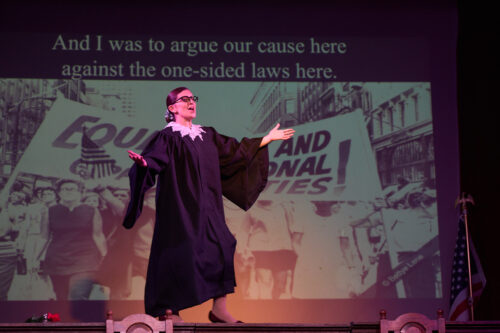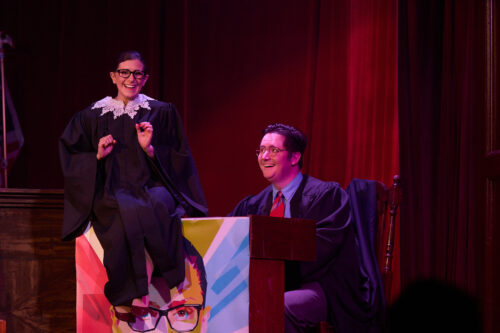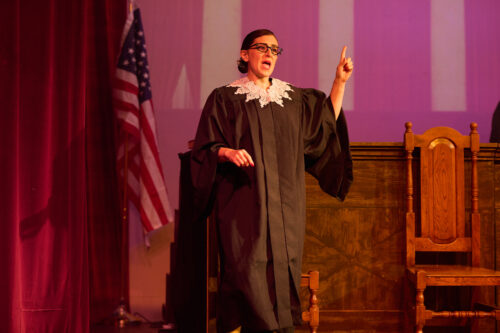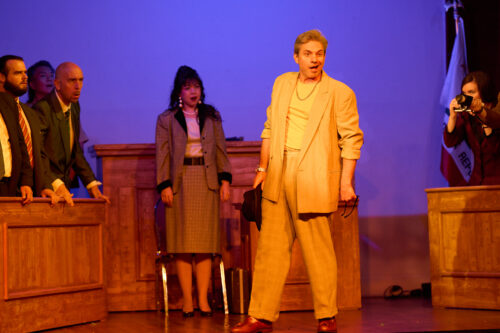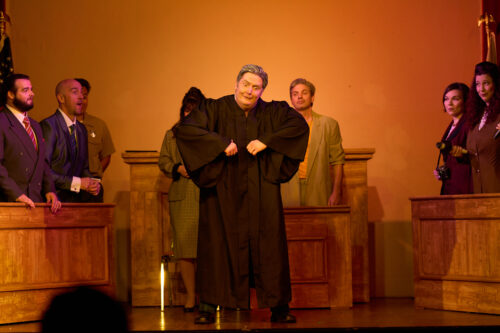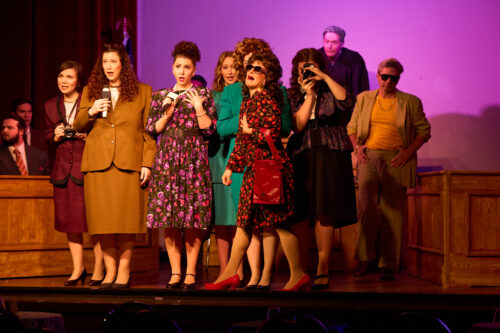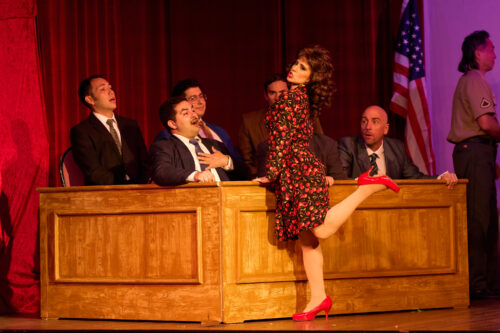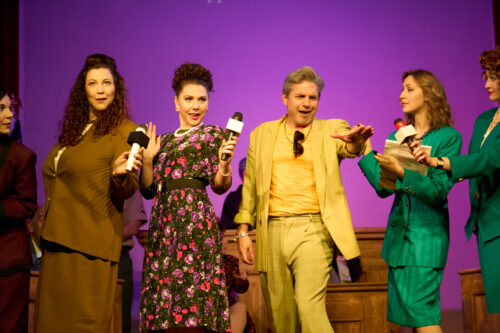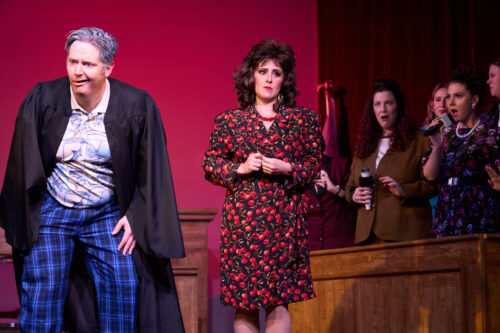JUDGING THE TRIALS
On Friday, Nov. 17, Pacific Opera Project opened its Los Angeles premiere of Derrick Wang’s Scalia/Ginsburg in a double bill with a new version of Gilbert and Sullivan‘s Trial by Jury, updated by Josh Shaw for Pacific Opera Project at the Highland Park Ebell Club.
Scalia/Ginsburg is about the late Supreme Court justices Antonin Scalia and Ruth Bader Ginsburg and their fondness for each other, even as they spar. A third character, the Commentator, arrives from the smoky depths under the stage and puts them through a Magic Flute-style series of trials. A smart smash-up of just about every bit of opera you can think of, combined with Supreme Court history, follows. The hour-long opera is decidedly non-partisan, giving equal time to the justices’ philosophies and quirks (here in liberal Los Angeles, it practically played like Ginsburg fan service).
Tenor William Grundler (Scalia) and soprano Rachel Policar (Ginsburg) offer clear voices and youthful vigor, but they’re out of step with the real ages of the characters, who are at least twice as old as they — but the duo do bear an uncanny resemblance to the famous jurists who shared a love of opera. With typical youthful casting by POP, Ginsburg’s entrance has Policar bounding on stage, wearing rainbow socks and pumping iron, prompting cheers from the audience. At one point, she tells Scalia matter-of-factly, “Women belong where all decisions are being made,” which prompted a chunk of the audience to applaud. Bass Paul Chwe MinChul An has a booming voice as the Commentator (a take on Mozart’s Commendatore in Don Giovanni), but his diction could get muddled — Caleb Yanez Glickman‘s seven-piece orchestra was having a lot of fun, but a mite loud, occasionally drowning out the three singers, even Policar, whose coloratura often pierced through.
The simple set of the courtroom consisted of the judges’ desk, some chairs, and a screen. In spite of the opera being in English, video installation projection with historical images and video combined supertitles, with every line getting a new image, some of which were in the wrong aspect ratio, but hey, you gotta stay within a small budget bringing opera to the masses. Supertitles could be projected before punchlines were delivered so the audience was already laughing before the lines were sung, meaning if we have great diction, do we really need supertitles in English for English lyrics? Don’t we want to be able just to watch the players?
Up next was Trial by Jury, with music by Arthur Sullivan and a new libretto by director Josh Shaw, based on W. S. Gilbert’s original. The slight story concerns Angelina’s lawsuit to divorce Edwin. We meet the partial jury, the corrupt judge, and the press. It’s a comprehensive rewrite that updates the setting to a divorce court in 1980s America, removing English-isms, modernizing the language, and adding references to Wall Street, book deals, pool boys, and so on. I’ve long felt that if a production throws out the original setting, then it might as well also toss out the original words, so credit to Shaw for going all the way (the jury in the opera is still all male here).
Returning in different roles are Policar as Angelina the wife, young and baby-faced Grundler hamming it up to the max as the old Judge, and An as the Usher. While the adaptation keeps some of Gilbert’s writing (no sane writer would write “tink-a-tank” today), it dispenses with the off-the-wall bonkers nature of his work. As originally written, Angelina enters the courtroom dressed as a bride with a chorus of bridesmaids, a very funny idea. Here, the bridesmaid chorus are now reporters, and Angelina enters in a dress that’s merely smart. I don’t see the point of setting Trial by Jury in the ’˜80s, other than that the ’˜80s are trending. We get all of Sullivan’s music, but only some of Gilbert’s words. It’s a fair paraphrase of the work. But now I’ll always hear “whore” and “From where I sit, they’re full of shit” when I remember this Gilbert and Sullivan one-act.
Todd Strange brings clarity and spark to Edwin the philandering husband. With some serious pipes, Soprano Christine Li plays the council, originally a baritone role — a very nice choice. David Harrington as the foreman had a genuinely funny bit where he finished a line that was intentionally out of Li’s vocal range. All the singers benefitted from the reduced orchestration which, in contrast to Scalia/Ginsbug, didn’t allow the vocals to melt into the orchestra. The 11-member chorus did lovely work.
For those who have never been to POP before, there is a general hamminess and pandering pervading the evening. Fun, perhaps, at times, but the shows come dangerously close to looking like an undergraduate theater production. This company no doubt has the ability to cast actors that match characters’ ages, which the opera world is beginning to do, but POP uses singers still breaking into opera, so it makes sense for the cast to be young, but, well, obviously you can call me a purist.
The Highland Park Ebell Club is sort of a black-box proscenium auditorium. The entire house was devoted to premium table seating. Behind that, where I sat, there were six rows of traditional seats, but they were literally in a back room. It felt disconnected and distant from the stage and main audience, but these seats are decidedly good if you’re on a super-tight budget. So is POP.
production photos by Kat Mueller
Scalia/Ginsburg (LA Premiere) & Trial by Jury
Pacific Opera Project
The Highland Park Ebell Club, 131 S. Avenue 57
performed in English with English supertitles
remaining performances:
November 24 at 7
November 25 at 7
November 26 at 3
ends on November 26, 2023
for tickets, call 323.739.6122 or visit POP
